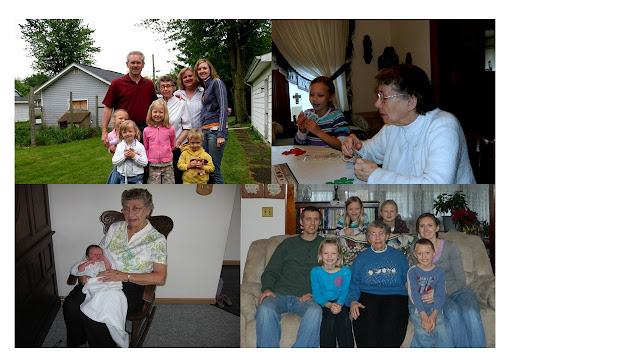A Chain of Red Yarn
Her name was Irene.
I remember her smile, the way it triumphed over the lines on her face and pushed them into submission. I remember studying her face, and wondering what circumstances collaborated to produce in her body the wrinkles and creases owed to 86 years of life. Hardships from lack of money? Anxious thoughts that wrung their wiry hands across the smooth surface of her life, rewriting innocence with experience? Perhaps heartbreak over love lost or unreturned? Maybe hours in the sun, working the land in exchange for food?
So much simmered beneath the surface that I could not
penetrate. Memories--guarded and treasured--kept silent, as if by sharing them,
those intangible souvenirs would slip from her grasp, and join the mounting
pile of things over which Irene had relinquished control.
Oh, how her world had grown small! When did the
possibilities in life stop opening before her, and begin closing? She still had
life left to live, but suddenly the scope of her world was reduced to this
building, and her people were simply the workers and the stranger she called
her roommate.
I had come to visit the home of the almost-forgotten. Admittedly, though, I felt the duty of those visits more keenly than love for its occupants.
I stood at the back and surveyed the room. Several tables stood as the hub for small groupings of chairs. The presence of dishes and silverware validated the room as a dining hall. If an observer could carefully peel back six or seven decades, this could easily have been a cafeteria full of students. Four chairs gathered around this table, three around that table, and in the back, the token chair by itself, representing for all decades the ones who eat alone.
But this was not a high school cafeteria, and the ones before me were shadows of youth. Instead of the carefree chatter of students, the clumsy clatter of silverware on plates filled the air.
It was to this familiar, yet unremembered, scene, that I went with my four young ones. Little hands in mine, we entered the wide, mechanical doors with a pretense of calm and order. Soon, the music of simple hymns from the piano drew us into the dining room, and I braced myself for short conversations where information was primarily repeated, rather than exchanged.
But first--music.
The choppy hymns were far from perfect. The college
students who offered this small church service to the residents didn't always
know all of the words. Oh, but the choruses! The choruses from years past
reached into the deep memories of the inhabitants, and took hold there,
awakening images and feelings that had long been dormant.
I scanned the crowd--the 10 or 12 souls collected in
wheelchairs--searching for these signs of recognition. A lady with matted gray
curls, blue eyes, and worn, quilted slippers locked eyes with mine. A tear had
started its path down her cheek, but finding the way difficult, had ceased to
fall.
"My name is Irene," she said, "What's
your name?"
I drew up a chair in my feeble attempt to defy
loneliness in Irene's life, and we began the customary conversation of
questions, introductions, and answers. The baby wriggled in my lap, aching to
be free, and the toddler scrambled about under the table, trying vainly to play
hide-and-seek. My two older girls sat squished into one chair, legs swinging,
attempting to amuse themselves during this long hour. Soon, I realized that we
had moved on to real conversation, and I was learning fragments of the large mosaic
that was Irene's life.
Each resident in that dining room was just waiting for a
chair to be pulled up, and a conversation to be started, though some were much
easier to talk to than others. There was Curt, a younger man in his forties who
communicated by pointing to letters on a chart to spell words. There was
Victoria, a feisty lady from New Jersey who had loud opinions and wanted
everyone to hear them. And then there was the man with the suspenders and the
Velcro shoes who couldn't say much, but always made the gentlemanly effort each
week to shake my hand.
Slowly, with much effort, the wheelchair souls became
people to me, and the next Monday, I
found myself there again. I made the rounds and tried to make sure that each
resident was greeted and attended to after the singing, but I gravitated
towards Irene. She remembered me; she remembered us.
The weeks passed, and our excursions to the home of the
almost-forgotten became less of a chore and more of a joy. The college students
completed their semester of weekly service to the residents, and went home for
Christmas. It was a dreary day, my kids were fidgety, and I had nothing to
offer Irene and company. But we went, and when I found Irene in her room, she
held out a gift to me: a single, crocheted chain of red yarn. Rough and imperfect--a treasure indeed--this chain crammed with love connected my heart to hers.
Oh, yes, I remember Irene.





Comments